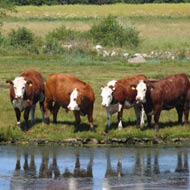
CVO says: "We must not relax our attitude"
Northern Ireland's testing regime for brucellosis is set to be reduced ahead of schedule.
Announcing the news, agriculture minister Michelle O'Neill said biennial herd testing for beef cattle will be introduced from next week (29 June).
Changes will be phased in over the next few months.
This is expected to bring significant benefits to farmers and taxpayers.
"I anticipate major savings for industry, taxpayers and the Department of Agriculture and Rural Development (DARD) through the gradual dismantling of the brucellosis scheme as we move forward," Ms O'Neill said.
Currently, the Brucellosis Eradication Programme costs farmers an estimated £7 million a year in compliance costs and taxpayers around £8 million a year.
Brucellosis is a highly contagious cattle disease characterised by abortions. It can be transmitted to humans, with serious consequences for human health.
It has been more than three years since the last confirmed brucellosis case in Northern Ireland. An application for officially brucellosis free (OBF) status is currently with the EU Commission. Brucellosis testing will continue for five years after OBF status is granted.
While the reduced testing has been welcomed by the government and veterinary associations, the chief veterinary officer Robert Huey stressed the importance of continued compliance with biosecurity advice and testing measures.
"We must not relax our attitude to the reporting of abortions or any suspicion of brucellosis," he warned.
An isolated case of BSE was recently confirmed on a farm in County Louth. BVA president John Blackwell said this shows vets and farmers "need to be ever vigilant against the incursion of disease. Now is not the time to be lax in that vigilance."
BVA and BVA Northern Ireland branch said the early reduction in testing requirements is a testament to the hard work of vets and farmers.
"This has taken real and effective partnerships between vets, farmers and government," Mr Blackwell commented.



 The veterinary mental health charity Vetlife is inviting the veterinary community to join it for a sponsored cold-water dip.
The veterinary mental health charity Vetlife is inviting the veterinary community to join it for a sponsored cold-water dip.